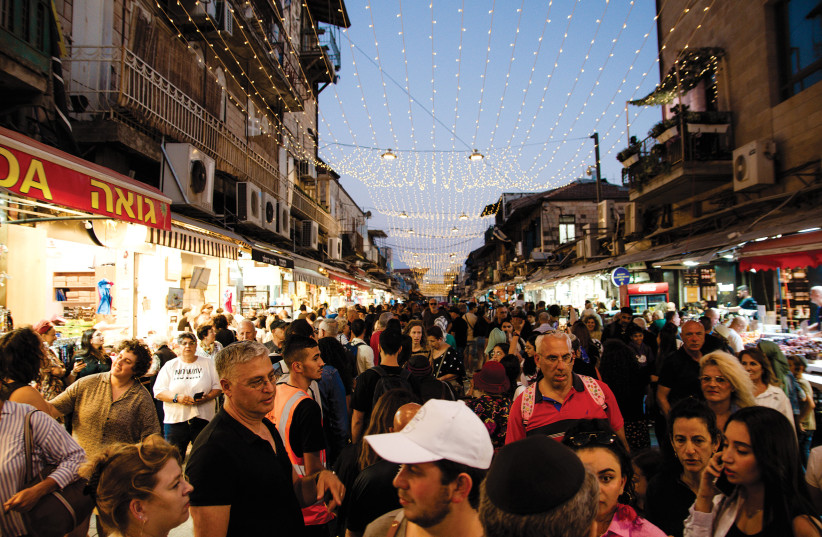
The president or chairperson of any organization has a bunch of headaches that come with the territory. Tali Friedman, the first woman to chair the Mahaneh Yehuda Market Merchants Association, has more headaches than she bargained for.
Nightlife throughout the alleyways of the market, as well as in the main areas, is on the rise, attracting literally thousands of young people to come to wine, dine, and listen to music. The market is particularly crowded on Thursday nights, when there are long queues outside almost every eatery. The neighborhood around the market contains a few yeshivot whose heads are worried that the secular youth who come for food and entertainment will have a negative effect on yeshiva students, and they have been trying for years to have the market closed at night.
Likewise, many of the residents whose homes form a ring around the market. They complain not only about the noise but also about the vandalism. Many of the merrymakers have no respect for private property and even relieve themselves in the stairwells of apartment buildings when answering nature’s calls. In addition to all that, major construction projects in and around the market continue. Most of these projects are residential, and the people who move into them later complain about the noise and the piles of garbage on the street.
What happened to due diligence? Was it so tempting to live near the market that people didn’t bother to check out the environment?
But Purim was the worst. On the night following the daytime Purim feast, the market was more crowded than ever, and local Hebrew papers ran near-identical stories about police being called in to stop the violence and the vandalism. Many people under the age of 18 were already inebriated when they arrived and continued to imbibe until they no longer had any control over their actions. They damaged property, fought with each other, and made life miserable for people who had simply come to enjoy themselves.

Some of the merchants, fearful that the violence might cost lives, called the police, who came and ejected the crowd. Some vendors were unhappy because it cost them a lot of potential income; others were pleased because it meant less violence and less destruction. Friedman has called for an urgent meeting of the city council to come up with solutions to the problems of vandalism and violence that threaten to get worse before they get better.
With regard to vandalism, some maliciously minded or egocentric people go around deliberately defacing posters, walls, doors, and even windows. This can be seen on the prospective Knesset Museum, which this week showed signs of workmen on the job; the hotel and commercial center being built on Jaffa Road by Laurent Levi; and numerous other city buildings.
Passover funds, foods for evacuees and soldiers
■ WITH PASSOVER around the corner, more requests for funds are in the offing. It has always been a Jewish tradition to provide for the poor during Passover, ensuring that they have a Seder to attend and sufficient food to last them for the whole of the festival. The problem this year is that so many organizations and institutions have been relying on charitable donations to purchase ingredients for meals for evacuees and soldiers fighting against Hamas in the South and Hezbollah in the North. They now bear the additional responsibility of ensuring the provision of food for needy Jewish individuals during Passover.
There’s a pre-Passover tradition in which people who symbolically sell their leavened products, instead of receiving a sum of money, pay for the privilege of selling, and this payment goes toward meals for the poor.
In order to raise funds for meals for lone soldiers, the Jerusalem Great Synagogue is inviting locals and visitors to Shabbat dinner and lunch on Friday and Saturday, April 19 and 20, following the Shabbat Hagadol services.
The cost of dinner is $100, or NIS 360; and lunch is $90, or NIS 255. Dinner will be served at 8 p.m. on Friday night after the service, and lunch at 11:30 a.m. For reservations, go to dinnerat.thejgs.org.
Tonight, Friday, April 5, the JGS congregation will celebrate the new Hebrew calendar month of Nissan with a Carlebach service led by Yitzchak Meir and the Jerusalem Great Synagogue choir, led by Elli Jaffe.
Rabbanit Ote's birthday
■ LAST SATURDAY was the Gregorian calendar date of the birthday of Rabbanit Atira Ote. On Saturday, she celebrated the Hebrew calendar date of her birthday, given that the Hebrew calendar is a lunar calendar, which absolutely coincides with the Gregorian calendar only once every 19 years; that happens regardless of the date on which one was born. Ordinarily, the person celebrating a birthday is the recipient of good wishes, but given the circumstances under which Israelis are living today, Rabbanit Ote felt that it was incumbent upon her to offer a blessing for all the people of Israel:
“May Hashem [God] help us wipe out the evil in this world without any more casualties or suffering. May all those who are being held captive return home safely. May all the wounded be fully and speedily healed. May we find the common ground and learn to love each other and enjoy real achdut (unity). May we be blessed with good health, happiness, and tranquility, and may we enjoy personal fulfillment by spreading more Torah, hessed, and light all around us.”
greerfc@gmail.com
